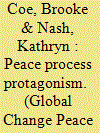| Srl | Item |
| 1 |
ID:
186856


|
|
|
|
|
| Summary/Abstract |
Why do Southeast Asian states use regional mechanisms for disaster relief? From a conventional functionalist perspective, inadequate domestic-level responses to emergencies create a demand for scaled-up governance. This article offers an alternative interpretation of disaster cooperation in Southeast Asia. Drawing on theoretical insights from comparative regionalism and critical disaster studies, it argues that the raison d’être of the Association of Southeast Asian Nations (ASEAN) Coordinating Centre for Humanitarian Assistance on Disaster Management (AHA Centre) is to empower ASEAN states vis-à-vis extraregional humanitarian actors. The AHA Centre works to enable Member States to gatekeep intrusive extraregional aid and, ultimately, to transform authority relations in the international humanitarian system in favor of state actors that have traditionally found themselves in a peripheral and passive role.
|
|
|
|
|
|
|
|
|
|
|
|
|
|
|
|
| 2 |
ID:
172157


|
|
|
|
|
| Summary/Abstract |
Regional and sub-regional organisations in Africa play vital roles in the promotion of peace and security on the continent. The African Peace and Security Architecture (APSA) mandates certain roles for AU-recognised Regional Economic Communities (RECs), and RECs have been active in many peace and security spheres from early warning to peace missions. This article seeks to illuminate the changing landscape of regional security governance in Africa, primarily through the lens of formal peace agreements, which are important tools for ending violent conflict. Extant research does not establish the frequency and capacity of regional organisations’ engagement in peace agreements. We present original quantitative data, systematically tracing these evolving and uneven activities. Our data establishes trends of REC peace agreement engagement that vary across Africa's sub-regions during 2002–2015. We further explore patterns of organisational interaction, presenting case studies of peace processes that highlight important variation in terms of the distribution of influence and authority.
|
|
|
|
|
|
|
|
|
|
|
|
|
|
|
|
| 3 |
ID:
167061


|
|
|
|
|
| Summary/Abstract |
States in the same region are bound together by the ways in which the world imagines them as a collective. One distinguishing feature of post-Cold War regionalism is its outward orientation – the importance of the external dimension of regional cooperation. By and large, though, existing analysis of regional institutional development in the Global South does not explicitly conceptualise and theorise collective image consciousness and management. This paper works to address this conceptual gap. Making use of two cases of regional image crisis – post-1980s Africa and post-1997 Southeast Asia – it draws out two primary logics of regional image consciousness: the logic of influence and the logic of resources. A region’s ‘brand’ with respect to (dys)function and international norm (non-)compliance matters to regional actors because it affects the region’s political influence in international arenas and the region’s ability to attract resources from donors and investors.
|
|
|
|
|
|
|
|
|
|
|
|
|
|
|
|